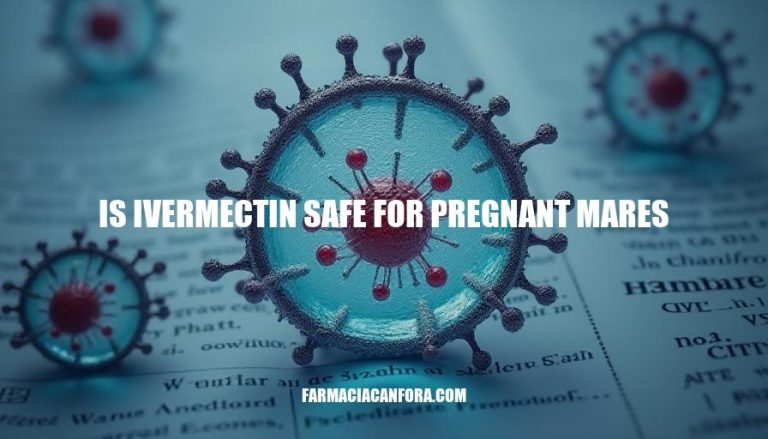


Ivermectin is a widely used antiparasitic medication in equine health management. The question of its safety for pregnant mares is crucial because it directly impacts the health of both the mare and her foal. Studies have shown that ivermectin, when administered correctly, is generally safe for pregnant mares. Understanding this safety is vital for effective parasite control, ensuring the well-being of the mare during pregnancy and the healthy development of the foal. Proper deworming protocols help prevent parasitic infections that could otherwise lead to complications during pregnancy and foaling.
Ivermectin is an antiparasitic medication widely used in veterinary medicine. It belongs to the avermectin family of drugs and works by interfering with nerve and muscle cell channels in parasites, leading to their paralysis and death.
In equine medicine, ivermectin is commonly used to treat a variety of internal and external parasites. This includes gastrointestinal worms like roundworms and bots, as well as external parasites such as lice and mites. Regular deworming with ivermectin helps maintain the health of horses by preventing parasitic infections that can cause significant health issues.
The safety of ivermectin for pregnant mares is a significant concern because any medication administered during pregnancy can potentially affect the developing fetus. While studies have shown that ivermectin, particularly in combination with praziquantel, is generally safe for pregnant mares and their foals, it is crucial to follow veterinary guidance. Overdosing or improper use can lead to adverse effects, including toxicity, which can manifest as neurological symptoms. Therefore, careful management and adherence to recommended dosages are essential to ensure the safety of both the mare and the developing foal.
Research indicates that ivermectin, often combined with praziquantel, is generally safe for pregnant mares and their foals. Key findings include:
Study by French and Brazilian veterinarians: This study administered ivermectin/praziquantel paste to pregnant mares at three times the therapeutic dose at 14-day intervals until birth. No adverse effects were observed in the mares or their foals.
General safety evaluations: Multiple studies have shown that ivermectin, when used as directed, does not cause significant adverse effects in pregnant mares. Past studies noted that even at higher doses, severe side effects like depression and ataxia were not observed.
These findings support the use of ivermectin as a safe deworming option for pregnant mares under veterinary guidance.
Ivermectin works by binding to glutamate-gated chloride ion channels in the nerve and muscle cells of parasites. This binding increases the permeability of the cell membrane to chloride ions, leading to hyperpolarization, paralysis, and death of the parasite.
In horses, this mechanism effectively targets gastrointestinal worms and bots. However, ivermectin can cross the blood-brain barrier in mammals, including horses, which can lead to neurotoxicity if overdosed. This is particularly relevant for pregnant mares, as the drug can potentially affect the developing fetus, leading to safety concerns. Therefore, careful dosing and veterinary supervision are crucial when administering ivermectin to pregnant mares.
Here are detailed clinical observations and reports from veterinarians regarding the use of ivermectin in pregnant mares:
Study by Mercier et al.:
Additional Study:
These studies indicate that while high doses can cause transient side effects, standard therapeutic doses of ivermectin-praziquantel paste are generally safe for pregnant mares and their foals.
Here are the guidelines and recommendations for the use of ivermectin in pregnant mares based on current research and veterinary advice:
Dosage and Administration:
Safety:
Timing:
Monitoring:
Veterinary Consultation:
These guidelines are based on current research and should be followed under the supervision of a qualified veterinarian to ensure the health and safety of both the mare and foal.
Ivermectin is generally considered safe for pregnant mares when administered correctly and in accordance with veterinary guidance.
Studies have shown that ivermectin, often combined with praziquantel, does not cause significant adverse effects in pregnant mares or their foals, even at higher doses.
However, it is crucial to follow recommended dosages and consult with a veterinarian before administering any medication to pregnant mares. The safety of the mare and her developing foal depends on careful management and adherence to veterinary guidance.